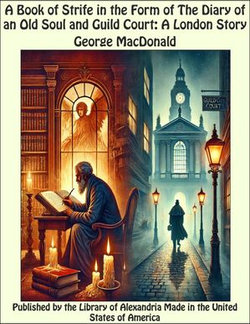In the month of November, not many years ago, a young man was walking from Highbury to the City. It was one of those grand mornings that dawn only twice or thrice in the course of the year, and are so independent of times and seasons that November even comes in for its share. And it seemed as if young Thomas Worboise had at his toilet felt the influences of the weather, for he was dressed a trifle more gayly than was altogether suitable for the old age of the year. Neither, however, did he appear in harmony with the tone of the morning, which was something as much beyond the significance of his costume as the great arches of a cathedral upheaving a weight of prayer from its shadowed heart toward the shadowless heavens are beyond the petty gorgeousness of the needlework that adorns the vain garments of its priesthood. It was a lofty blue sky, with multitudes of great clouds half way between it and the earth, among which, as well as along the streets, a glad west wind was reveling. There was nothing much for it to do in the woods now, and it took to making merry in the clouds and the streets. And so the whole heaven was full of church windows. Every now and then a great bore in the cloudy mass would shoot a sloped cylinder of sun-rays earthward, like an eye that saw in virtue of the light it shed itself upon the object of its regard. Gray billows of vapor with sunny heads tossed about in the air, an ocean for angelic sport, only that the angels could not like sport in which there was positively no danger. Where the sky shone through it looked awfully sweet and profoundly high. But although Thomas enjoyed the wind on his right cheek as he passed the streets that opened into High Street, and although certain half sensations, half sentiments awoke in him at its touch, his look was oftenest down at his light trowsers or his enameled boots, and never rose higher than the shop windows. As he turned into the church-yard to go eastward, he was joined by an acquaintance a few years older than himself, whose path lay in the same direction. "Jolly morning, ain't it, Tom?" said he. "Ye-es," answered Thomas, with something of a fashionable drawl, and in the doubtful tone of one who will be careful how he either praises or condemns anything. "Ye-es. It almost makes one feel young again." "Ha, ha, ha! How long is it since you enjoyed the pleasing sensation last?" "None of your chaff, now, Charles." "Well, upon my word, if you don't like chaff, you put yourself at the wrong end of the winnower." "I never read the Georgics." "Yes, I know I was born in the country—a clod-hopper, no doubt; but I can afford to stand your chaff, for I feel as young as the day I was born. If you were a fast fellow, now, I shouldn't wonder; but for one like you, that teaches in the Sunday-school and all that, I am ashamed of you, talking like that. Confess now, you don't believe a word of what you cram the goslings with." "Charles, you may make game of me as you like, but I won't let you say a word against religion in my presence. You may despise me if you like, and think it very spoony of me to teach in the Sunday-school, but—well, you know well enough what I mean." "I can guess at it, old fellow. Come, come, don't think to humbug me. You know as well as I do that you don't believe a word of it. I don't mean you want to cheat me or any one else. I believe you're above that. But you do cheat yourself. What's the good of it all when you don't feel half as merry as I do on a bright morning like this? I never trouble my head about that rubbish. Here am I as happy as I care to be—for to-day, at least, and 'sufficient unto the day,' you know." Thomas might have replied, had he been capable of so replying, that although the evil is sufficient for the day, the good may not be. But he said something very different, although with a solemnity fit for an archbishop.



Share This eBook: